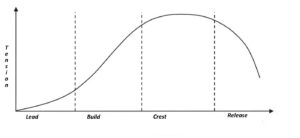When we feel isolation or rejection by our family of origin, what then? When the family we married into isolates or rejects us, what then? Do you know how to deal with feeling isolated from your family? I’m learning how this works in mine.
A very personal question
I’m blessed – and that’s the word I mean to use – by the family I married into. My stepdaughters and stepson are just amazing in so many unique and beautiful ways. I’m over the moon about my wife. I’ve never known happiness like this.
But here’s the thing: I’m also the outsider. I’m certainly the fifth wheel, the newest member of the family, the one who’s trying to catch up. Much of the time on family outings, I’m literally walking behind the rest of them, trying to catch up. But it’s more than that: I’m actually still trying to find a way in – a place at the inner circle of my family. Much of the time, I feel isolated; some of the time I feel rejected.
So, this question of how to deal with feeling isolated from my family is very personal for me.
And, I need you to know right now that I don’t have all the answers…
…but I’m glad to share what is working for me so far. Maybe it will help you, too.
Weaponized isolation
First, let’s discuss the family that uses isolation as a tactic, either to help heal or to hurt itself. There had better be a good reason to deliberately push parents or grandparents, siblings, relatives, or other extended family members out of the family circle. When family members get hurt, it’s destructive. When it’s done to protect, it’s justifiable.
If you are being hurt in a weaponized family situation like this, please get professional help – an article can only encourage you so far and you deserve an active partnership to help stop the hurt.
If you are isolating yourself and/or those you love for protection from a toxic family situation, kudos for your bravery and courage.
In either case, if you would like more hands-on help, please reach out beyond this article. In addition to professional assistance, your city or county may have resources that can aid you in your specific situation. For example, you can connect with resources both public and private in many counties across America by dialing 2-1-1 from any phone.
Let’s return to the family of your closest kin.
Surrender
I mean this in the most altruistic sense possible. When nothing can be changed through my own effort, I surrender. When I cannot impact the outcome, I surrender. To be clear, surrender is not the same thing as giving up.
Here are some examples of surrender:
I can’t make my family walk beside me, so, to be with them, I surrender to walking behind them. It’s the same love either way. The choice for isolation would be not walking with my family at all, and I don’t want more than that. While I still feel separate, I’m not isolated.
I can’t change the way my political party thinks and acts, so, to continue to vote with them, I surrender to the majority thinking and acting. I could isolate myself by not voting at all, but I still retain some loyalty, so I choose surrender over isolation.
The beautiful thing about surrender is that, with practice, one recognizes how little can actually be changed through effort, and the energy formerly spent in resistance becomes available for more productive tasks.
Do you see how surrender is not the same as capitulation? Stay with it, because the next concept/tool may help explain.
Acceptance
This is more difficult than surrender. There can be a “hold your nose” quality to surrender, but acceptance means to take in the whole messy putrid stench of what irks us and love it. Appreciate it. Most importantly, allow it. Acceptance has a “go with the flow quality about it.
Music Quest Discovery. Courage in acceptance.
Example:
“I accept you, hurtful family member, for what you are, without judgment or condition.” This is “being the bigger person” but with full knowledge and understanding of the other person’s flaws, faults, limits, and hurtfulness. It allows for a connection, however poor, to supersede building a protective wall and cutting off communication (isolation anyone?). Given the opportunity, saying these words might also be the trigger for change. Likewise, accepting the other person for who they genuinely are in a judgment-neutral way might unlock their potential in some way.
Choosing connection over isolation is like that, and acceptance unlocks that possibility. Why? Because practicing acceptance is loving of the toughest kind.
Impermanence
Said another way: everything ends. There’s a temporary sense to our universe: stars flash into and out of existence; Earthlings are born and pass away; the shapes of the continents from eons ago would be unrecognizable to us today. A family, regardless of the size of its family tree, is just a random organization of a number of Earthlings, some blood-related, some not. We are all connected in this way…and paradoxically isolated in this way as well, when racism, nativism, nationalism, economicism, even religionism are used to separate us.
What is permanent is the notion of a connected family of all Earthlings. What is impermanent is that this notion actually informs how Earthlings behave toward each other.
Let’s take a smaller example:
Like all good teenagers, one of my stepkids doesn’t like to clean their room. Ever. It’s layers deep in there. One day, an upper layer of crap hid my ukulele. It got stepped on and broken. Not that it’s much of a ukulele, but I expected that, as its owner, I might at least be told of its demise in some semi-contrite manner.
I realize I’m still fairly terrifying to my family-by-marriage, but at least I still walk near them (see Surrender above) and that’s better than isolation. I surrender to and accept my family, so I resolved to address this using impermanence.
Hang in there; it takes a bit more explanation.
I found out about the broken uke from another of my step kids. It feels silly to say this, but I got triggered to sadness, and I actually cried. Was this response about my Dad’s passing from almost a year ago? Why would I get so triggered by the death of this small musical thing I cherished? I’d used the uke to practice a song my wife and I performed on our wedding day. Then I began to think this response fit right into impermanence.
There are times when accumulation gives way to distribution. Keeping so much stuff around all the time can get cumbersome, especially, as they say, when you can’t take it with you. At some point, I’d begun to realize that the cost of keeping so much stuff around outweighed the benefit of doing so, and I began to let stuff go.
I found myself having a tough time being angry about throwing away one more bit of accumulation, which also meant I wouldn’t have a scary visage around my family. Thanks, Impermanence! Yes: I’m still sad and disappointed that the perp hasn’t walked my way to apologize, but I learned through impermanence that what matters more is allowing my stepkid to be who they are and do what they must, so the connection is still there if they want to make it. I haven’t withdrawn or deepened any feelings of isolation, and sometimes neutral is better than bad or worse.
So this lesson in impermanence is already a win/win for me: less stuff, still connected. It could be a win/win/win someday, but only if my stepkid chooses to go there.
Surrender, Acceptance, Impermanence
If you’re feeling this is Buddhist teaching, you’d be mostly correct. I’m not a Buddhist, but practices that generally make sense to me often turn out to have deep roots in Buddhism. On the other hand, do you see any Christian, Jewish, Muslim, or other religious principles at work here?
Conversely, if you belong to an organization of any size, do you see how these three practices might transform that organization? How about politics? There’s no reason why, if we can get families to start trending toward connection, we can’t scale that up to enterprises and governments. But I’m probably breaking some Law of Improbability just to suggest that.
These practices are effective, or they wouldn’t still be in use. And they are in widespread use! You now know something about my story; do you recognize that the end isn’t as important as what happens along the way?
It’s a process
The process of things fascinates me. Connection to a family – of any kind – is a powerful thing, and much better than isolation in so many ways. When I stopped attempting to force my family to connect in the way I wanted and began to accept a connection in the way they wanted, things began to change for good. That change isn’t over yet, but it was one that I initiated using the three practices in this article.
And eventually, that process won’t be necessary anymore, so it will be replaced by a whole new series of challenging surrender, acceptance, and impermanence.
Anyway, that’s how I see it.
There’s more how-to here
Please don’t think we’d ever leave you without any guidance! You can find some useful how-to in this article: Three Tips For Finding Joy And Contentment In Your Life Each And Every Day. Or simply contact us here.
You can also work alongside us to help supercharge your process by engaging healing music – music you love – for your wellness. Schedule a consultation here.
Ready for a deeper dive? The Musimorphic Quest, a fully-mentored online active-learning experience will immerse you in practical ways to meet life’s challenges with skills you may not realize you already have. It’s not for everybody, but you are that unique individual who really resonates with the power of music and wants to learn to wield it with skill, give it a try. The landing page is here.
How To Deal With Feeling Isolated From Your Family



